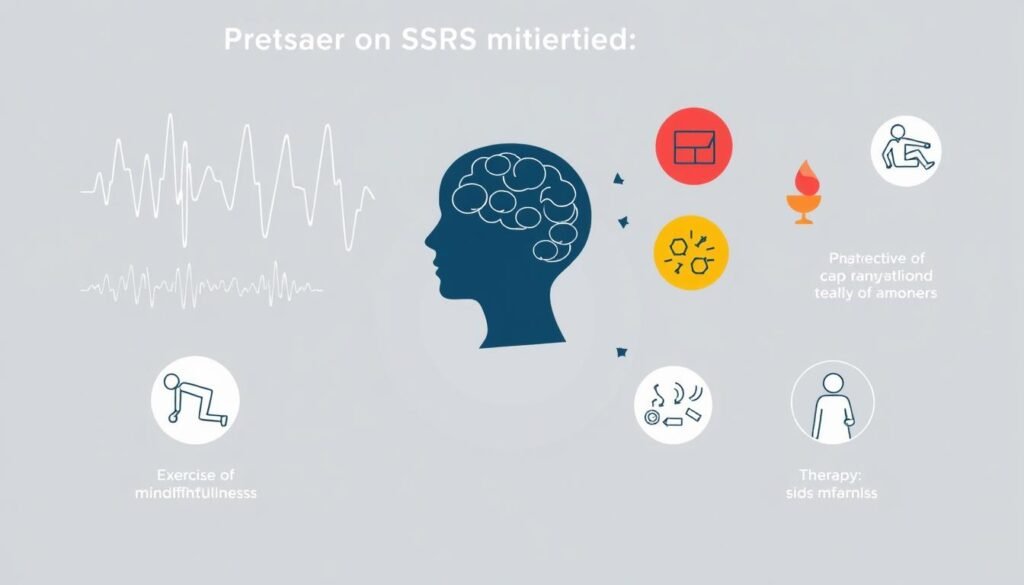Did you know that about 13% of U.S. adults take antidepressants? This fact shows how important these drugs are in treating mental health problems. Among them, Selective Serotonin Reuptake Inhibitors (SSRIs) are the most common. They help by increasing serotonin, a key brain chemical that affects mood. SSRIs are used for depression, anxiety, and other mental health issues.
What makes SSRIs stand out is their safety and fewer side effects. They are often the first choice for people dealing with tough mental health issues. When learning about SSRIs, it’s important to know how they work. They treat many conditions and greatly improve a person’s well-being. Let’s learn more about their role in treating depression and anxiety.
Key Takeaways
- SSRIs are effective in treating various mental health conditions, including depression and anxiety.
- They work by increasing serotonin levels in the brain, helping improve mood.
- SSRI treatments generally take 4 to 6 weeks to show positive changes.
- About 13% of U.S. adults are currently on antidepressants, highlighting their widespread use.
- SSRIs typically have fewer side effects than older classes of antidepressants.
- They can be prescribed for conditions beyond depression, such as OCD and PTSD.
Understanding SSRIs and Their Importance
SSRIs, or selective serotonin reuptake inhibitors, help treat depression and anxiety. They boost serotonin in the brain. This boost improves mood and emotional health. Serotonin affects how we handle stress and anxiety, showing why SSRIs are vital.
In the US, about 6.8 million adults have Generalized Anxiety Disorder (GAD). That’s roughly 3.1% of people each year. SSRIs are often the first choice to treat anxiety. They are safe and not addictive. Unlike benzodiazepines, SSRIs don’t cause dependence and work over time. They help with anxiety in 4 to 8 weeks and also fight depression, impacting 6.7% of Americans yearly.
Choosing SSRIs means considering side effects like nausea, insomnia, and headaches. Yet, for many, the positives outweigh these issues. Knowing about SSRIs helps patients and doctors make better treatment choices for anxiety and depression.
| Condition | SSRI Effectiveness | Yearly U.S. Affected Population |
|---|---|---|
| Generalized Anxiety Disorder (GAD) | First-line treatment | 6.8 million |
| Depression | Effective for mood regulation | 16.1 million |
| Social Anxiety Disorder | FDA approved for treatment | Not specified |
| Postpartum Depression | SSRIs among treatment options | 20% of new mothers |
What are SSRIs?
Selective serotonin reuptake inhibitors, or SSRIs, are a type of antidepressant. They aim to improve mood by boosting serotonin levels in the brain. SSRIs work by stopping the reabsorption of serotonin. This lets more serotonin stay available for nerve cell signaling. This method is key for treating depression and anxiety effectively.
Definition and Classification
SSRIs are a group within a larger class of antidepressants that affect mood-related neurotransmitters. They’re the most prescribed antidepressants because they work well and have fewer side effects. Their targeted action on neurotransmitter activity makes them a favorite choice for doctors.
Common SSRIs Prescribed
The U.S. Food and Drug Administration (FDA) has approved multiple SSRIs for treating depression and other mental health issues. Common SSRIs include:
- Citalopram (Celexa)
- Escitalopram (Lexapro)
- Fluoxetine (Prozac)
- Paroxetine (Paxil)
- Sertraline (Zoloft)
These drugs are powerful in managing depression, anxiety, OCD, PTSD, and panic disorder. This shows SSRIs’ flexibility in treating various mental health conditions.
How SSRIs Work to Treat Depression and Anxiety
Selective serotonin reuptake inhibitors, or SSRIs, are crucial for treating depression and anxiety. They block serotonin’s reabsorption in the brain. This action boosts serotonin levels, improving neuron communication and mood signals.
SSRIs are highly effective for disorders like generalized anxiety disorder (GAD) and panic disorder. They also help with obsessive-compulsive disorder (OCD) and post-traumatic stress disorder (PTSD). About one quarter of people will face severe anxiety symptoms at some point. SSRIs offer a vital solution to enhance life quality.
While SSRIs are usually safer than other depression drugs, side effects can occur. These include nausea, sleep issues, and weight changes. It’s crucial to stay in touch with healthcare providers to track treatment results. For more details on SSRIs, including their benefits and side effects, check resources like this comprehensive evaluation.
The Science Behind SSRIs: Neurotransmitters and Brain Chemistry
Understanding neurotransmitters, especially serotonin, is key in exploring SSRIs’ effects on our brain and mood. Serotonin is a vital neurotransmitter that helps neurons communicate. It plays a big role in our mental health, affecting our emotions and well-being.
Serotonin is especially important for mood regulation.
Role of Serotonin in Mood Regulation
Serotonin is known as the “feel-good” neurotransmitter, crucial for keeping our mood balanced. It does more than make us happy; it also manages anxiety and emotional stability. Changes in serotonin levels can cause anxiety and depression. This highlights why treating mood disorders effectively is so necessary.
Mechanism of Reuptake and Inhibition
SSRIs target the reuptake process of serotonin. In this process, serotonin is absorbed back into the neuron after signaling. SSRIs stop this reuptake, leaving serotonin in the gap between neurons longer. This helps with mood regulation and lessens depression and anxiety symptoms. Understanding this mechanism explains why SSRIs are effective.

Studies show SSRIs mainly target serotonin but other neurotransmitters like norepinephrine are also important for our mood. Both SSRIs and SNRIs, which inhibit the reuptake of serotonin and norepinephrine, show the complex role of neurotransmitters in fighting depression and anxiety. A closer look at these processes could improve treatment options. For more information, see this study.
| Neurotransmitter | Role in Mood Regulation |
|---|---|
| Serotonin | Regulates mood, anxiety, and overall emotional stability |
| Norepinephrine | Involved in the “fight or flight” response and energy levels |
| Dopamine | Impacts reward and pleasure, crucial for motivation |
Benefits of SSRIs in Treating Mental Health Conditions
Selective serotonin reuptake inhibitors (SSRIs) help a lot with different mental health conditions. They are especially useful for depression. People like them because they work well and don’t have many bad side effects.
Conditions Treated by SSRIs
SSRIs are good for treating serious mental health conditions, such as:
- Major depressive disorder
- Generalized anxiety disorder
- Panic disorder
- Obsessive-compulsive disorder (OCD)
- Post-traumatic stress disorder (PTSD)
SSRIs are really effective for these issues, even more than other antidepressants. This is true especially for tough cases of depression. Studies show that they work even better when used with therapy, like cognitive behavioral therapy.
Efficacy Compared to Other Antidepressants
SSRIs have a good history of making depression symptoms better. They help more in severe cases than other types of antidepressants. Here’s how they compare:
| Antidepressant Class | Efficacy | Side Effects |
|---|---|---|
| SSRIs | High for moderate to severe depression | Generally mild; may include stomach upset and sexual problems |
| Tricyclic Antidepressants | Varied; most effective but higher risks | Higher risk of overdose; serious side effects |
| MAOIs | High; limited use due to diet restrictions | Potentially severe dietary restrictions |
Some antidepressants can make you gain weight, but SSRIs usually don’t cause too much weight gain. People often prefer SSRIs because they have good benefits with fewer side effects. They are a top choice for many mental health conditions.
Managing Risks and Benefits of SSRIs
Selective serotonin reuptake inhibitors (SSRIs) are important for treating mental health. They have many benefits. However, it’s crucial to manage their risks. This ensures safety and the well-being of patients. Knowing about the side effects and how to handle them helps in achieving good treatment results.
Possible Side Effects
SSRIs might cause side effects that affect one’s life. People often report symptoms like:
- Nausea
- Indigestion
- Diarrhea
- Dizziness
- Drowsiness
- Dry mouth
- Blurred vision
- Insomnia
- Weight gain
- Sexual dysfunction
Knowing about these side effects helps in addressing them quickly.
Important Safety Considerations
When using SSRIs, safety is key. It’s important to watch for serotonin syndrome, which can be serious. Also, check for drug interactions. Talking with healthcare providers about your meds is a must.
Risk Mitigation Strategies
There are ways to make SSRIs safer. Key steps include:
- Talking regularly with your healthcare provider about any side effects.
- Following the prescribed dosages closely.
- Having regular check-ups to see how you’re doing.
Following these steps can make your treatment safer and better. You can learn more about SSRIs and their risks in this relevant article.

Treatment Adherence and Patient Education
Sticking to your treatment is key when dealing with depression and anxiety using SSRIs. Many studies have shown that lots of patients find it hard to follow their treatment plans closely. By knowing what to expect from SSRIs and getting the right support, we can teach patients better. This helps more of them stick to their treatment.
Setting Expectations with SSRIs
Many patients have a hard time following their treatment plan. Studies show that more than half of those with major depressive disorder skip their medication. This can lead to a comeback of symptoms and more doctor visits. Teaching patients how long it takes for SSRIs to work can set real expectations.
Patients should know it might take weeks to feel better.
- About 25% of patients stop treatment in the first month.
- 44% quit within three months, not giving it enough time to work.
- Things like side effects and not feeling better can make patients quit early.
Importance of Communication with Healthcare Professionals
Talking openly with doctors helps patients stick to their treatment. Patients who share their SSRI experiences tend to stay on track. Psychologists say talking about side effects upfront helps.
Discussing treatment options and handling side effects lets patients play a part in their own care. This way, doctors can tweak treatment as needed, making the whole process better.
SSRIs and Special Populations
Doctors think carefully before prescribing SSRIs to certain groups. This includes pregnant women and young people or kids. They look at the good and bad points for each group closely.
SSRIs During Pregnancy
When it comes to pregnancy, SSRIs are a tricky topic. Doctors have to balance the mom’s mental health with the baby’s safety. If the mom’s health benefits more from the medicine, they might choose to prescribe it. Not treating a mom’s depression can be bad for her and the baby.
Drugs like Sertraline and Fluoxetine are often seen as safe for pregnant women. It’s critical to watch the mom’s health closely while she’s on these drugs.
SSRIs for Younger Adults and Children
Prescribing SSRIs to young people and children is done carefully. The worry is that these drugs might make them think about suicide more. Doctors have to really think about if the benefits outweigh the risks.
A study in JAMA Psychiatry showed SSRIs work better than fake pills for kids and teenagers. But, SNRIs are not the first choice. They might have bad side effects and there’s not a lot of proof they work well for the young.

| Population Group | SSRIs Usage | Considerations |
|---|---|---|
| Pregnant Women | Sertraline, Fluoxetine | Balance of maternal benefits vs fetal risks |
| Younger Adults and Children | SSRIs | Monitoring for suicidal thoughts, cautious approach |
Looking into SSRIs for special groups shows why personalized care is key. It’s about making sure the treatment fits the person’s exact health needs. Talking regularly with doctors makes the therapy safer and more effective.
Alternative Treatments and SSRIs
SSRIs are often the first choice for tackling depression and anxiety. Yet, many people look for extra treatments to boost their mental wellness. These alternative treatments improve SSRIs’ effects and offer a fuller approach to mental health care. Options like cognitive behavioral therapy (CBT), mindfulness, yoga, and lifestyle changes are popular.
Including these therapies with SSRIs can lessen the reliance on medications, studies suggest. Cognitive behavioral therapy helps change bad thought habits and promotes positive actions. It pairs well with SSRIs to better mood.
Talking about alternative treatments with doctors is key. Working together on a custom plan can make the most of SSRIs and added therapies. Such plans often involve regular check-ups to see how things are going and to tweak as needed.
Alternative treatments do more than ease mental symptoms; they boost overall health. By adding these to SSRIs, people build a strong support system for their mental wellness. This can improve how they handle stress and enrich their lives.
Conclusion
SSRIs are key in treating mental health issues like depression and anxiety. Since fluoxetine was introduced in 1988, these drugs have been the go-to for psychiatric conditions. The cost of depression in the U.S. is more than $210.5 billion. So, finding effective treatments is crucial. SSRIs help by improving mood and often have fewer side effects than other antidepressants.
It’s important for patients to understand SSRIs as they manage their mental health. Talking with doctors can make treatment more effective. Better mental health comes from this. Combining SSRIs with therapy can give even better results. It shows how key it is to stick with treatment and have good support.
As mental health care advances, SSRIs stay important for fighting depression and anxiety. They bring hope to many worldwide. For more on depression and how to manage it, this resource is useful. Knowing about treatment options is a big step towards better mental health.